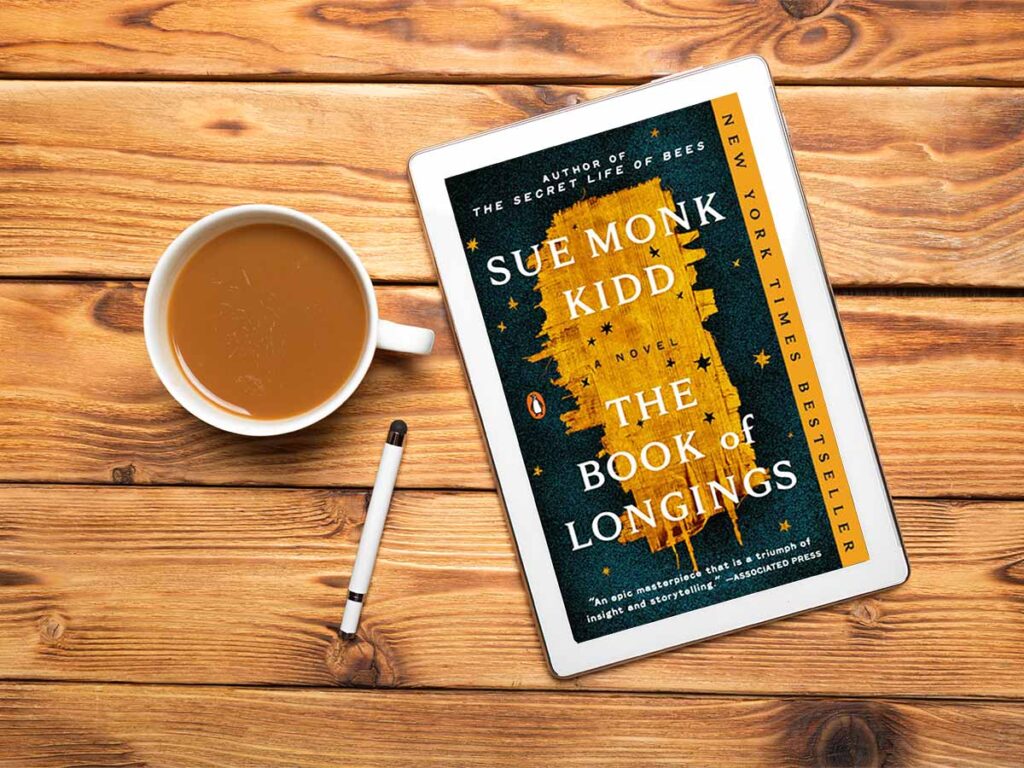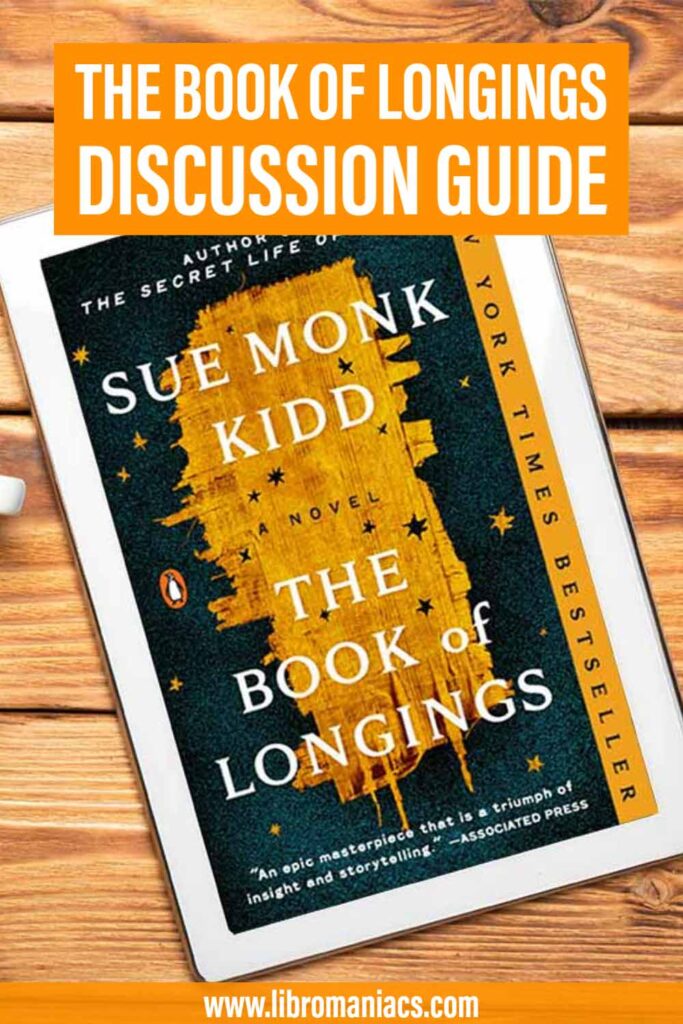Since your book club was prepared to take on a controversial novel, The Book of Longings is sure to spark your conversation. The most recent bestselling novel by Sue Monk Kidd, The Book of Longings humanizes the dramatic Biblical world and sheds a modern light on characters whose revolutionary personalities made them ahead of their time.
Kidd unearths many questions as she tunnels towards her novel’s central theme. How do women experience spirituality in a religious system dominated by men? How can we both protect and support the women we love in a society where oppression is the norm? Is it enough to long for a brighter future, or should we sacrifice everything we have to bring that future into existence? We’re here to help you approach these themes and others with our list of The Book of Longings book club questions.

Our discussion guide for The Book of Longings is designed to enrich your book club’s analysis of the novel. First, we’ve provided a synopsis of The Book of Longings, to help you keep track of the major plot points. Next, we’ve crafted 10 The Book of Longing book club questions. These questions should draw out the different perspectives and insights among your book club members. Finally, we’ve curated a few quotes from book reviews to put you in touch with the world’s reaction to this groundbreaking novel.
If you enjoyed the book, be sure to read to the end of this guide for three more books like The Book of Longings.
(This article contains affiliate links. This means that if you choose to purchase, I’ll make a small commission.)
The Book of Longings Synopsis
The Book of Longings, Sue Monk Kidd
In her mesmerizing fourth work of fiction, Sue Monk Kidd takes an audacious approach to history and brings her acclaimed narrative gifts to imagine the story of a young woman named Ana. Raised in a wealthy family with ties to the ruler of Galilee, she is rebellious and ambitious, with a brilliant mind and a daring spirit. She engages in furtive scholarly pursuits and writes narratives about neglected and silenced women. Ana is expected to marry an older widower, a prospect that horrifies her. An encounter with eighteen-year-old Jesus changes everything.
Their marriage evolves with love and conflict, humor and pathos in Nazareth, where Ana makes a home with Jesus, his brothers, and their mother, Mary. Ana’s pent-up longings intensify amid the turbulent resistance to Rome’s occupation of Israel, partially led by her brother, Judas. She is sustained by her fearless aunt Yaltha, who harbors a compelling secret. When Ana commits a brazen act that puts her in peril, she flees to Alexandria, where startling revelations and greater dangers unfold, and she finds refuge in unexpected surroundings. Ana determines her fate during a stunning convergence of events considered among the most impactful in human history.
Grounded in meticulous research and written with a reverential approach to Jesus’s life that focuses on his humanity, The Book of Longings is an inspiring, unforgettable account of one woman’s bold struggle to realize the passion and potential inside her, while living in a time, place and culture devised to silence her. It is a triumph of storytelling both timely and timeless, from a masterful writer at the height of her powers.
10 The Book of Longings Book Club Questions
- Ana introduces her husband, Jesus, with this memory: “That he bent his heart to mine on our thin straw mat and listened was the kindness I most loved in him.”
Why do you think listening is such an important form of kindness to Ana? Does listening matter if it is not followed up by action?
- Why do you think Ana’s father supported her effort to learn to read and write as a child, only to demand that she give up her talents when she became a wife? Do you have any talents you nurtured as a child and surrendered as an adult?
- Under Yaltha’s tutelage, Ana begins using a female name (Sophia) when she prays to god rather than using a more traditional name (Yahweh). Do you feel like god has a gender? How do you think the world would be different under a female or male god?
- In the stories Ana records, many of the women who are most cruelly wronged by men, like Tabitha, Bathsheba, and Dinah, are also described as women who are extremely alluring to men.
Why do you think this incongruity occurs? Why might a man grow to resent a pleasing woman as much as a defiant one?
- After learning that Jesus has concealed his previous engagement to Judith, Ana decides to accept his decision to keep secrets. She reflects, “We had our togetherness. Why should we not have our separateness too?”
Do you agree with Ana that some secret-keeping should be tolerated in marriage? What are the risks of allowing or forbidding secrets?
- Yaltha affirms Ana’s wish not to have children by saying, “I don’t doubt you should give yourself to motherhood. I only question what it is you’re meant to mother.”
Do you think it’s possible to “mother” something that isn’t a human child? How might maternal instincts help someone with a project like writing a book, mastering an instrument, or governing a city? How might raising a human child be different from any other project?
- Jesus and Judas share common goals; they long to rid their land of corrupt rulers and to uplift poor and oppressed people. Judas believes these goals justify (and perhaps demand) a violent revolution, whereas Jesus believes in teaching kindness by example.
If you had witnessed the injustices that Judas witnesses, do you think you would be prepared to support a violent revolution? Would you take a peaceful teacher like Jesus seriously? How might Jesus’s crucifixion sway your opinion, one way or the other?
- Most modern Christians agree that forgiveness is one of Christ’s greatest lessons. However, when Ana sees Judas watching the crucifixion, she nods at him and reflects, “It was not forgiveness I sent. It was pity.”
How do you feel about Christ’s injunction to forgive all wrongs and love your enemies? Are there unforgivable acts? Are there other emotions, like pity, that can substitute for forgiveness?
- Ana returned to Alexandria rather than accompanying the other women back to Jesus’ tomb. Therefore, she missed the Resurrection as it is described in the Christian Bible. Why do you think Sue Monk Kidd chose not to have Ana witness the resurrection? Would you have felt differently about the book if the Resurrection scene had been included? How so?
- When Ana is distressed over her betrothal, Yaltha urges her, “Return to your longing. It will teach you everything.” What can you learn about yourself through your longings? What distractions keep you from listening to your longings?
Selected Reviews for The Book of Longings
“If people want to see what it really looks like to live by the rule ‘wives submit to your husbands’ this can show you how bad a world that really is. It shows how painful and horrible the patriarchy really is. We need a world not where one gender rules over another, but where we have both genders equal. It’s a tough line to make work, because you have to let both people have the openness to bring out their true potential and that has pain attached to it.”
“I did not like Ana, Jesus’s wife. And because of this the entire book failed for me. […] She is very selfish and self absorbed. Everything is about what she wanted. She had a servant that she freed but expected him to do everything she wanted the minute she wanted it. He has a new job and a new wife in Egypt but she expects him to drop everything and escort her back to Jesus. He doesn’t want to but she accuses him of being selfish (what?). […] On the whole, this was a very unsatisfactory read for me. I’d like to think if Jesus married it would be to a nicer person.”
“I found it odd to assign modern female sensibilities about women’s roles, rights, lives, etc. to a character who would be very unlikely to have these thoughts. We are creatures of our times; ignoring that takes the reader out of the story.”
“I think what lowered my rating is that it felt like separate stories: 1. Ana’s and 2. Jesus’s, and the merging of the two stories felt forced, especially as we were only really allowed to ‘see’ Jesus for very short periods of time.”
“I enjoyed most of Ana’s story. I did get pretty bored when she left Galilee for Alexandria for a couple of years and lots and lots and lots of details were written about Alexandrian society and the library and papyri. Kidd explained in the author’s note that all of those historical details were true and…I could tell. It read like a documentary instead of a story and didn’t blend very well with the rest of the book.”
3 Books Like The Book of Longings
For a few other historical fiction books set in the way back, have your book club consider The Marriage Portrait, or Hamnet (both by Maggie O’Farrell).

Circe, Madeline Miller
Like The Book of Longings, Madline Miller’s Circe is a bold retelling of an ancient legend, but this time, the plot follows a divine character–Circe, Goddess of Magic–rather than a human protagonist. In an interesting parallel to Ana’s struggle to manifest the divine calling inside herself, Circe longs to uncover and nurture the mortal human traits inside herself. The lavish historical setting and famous cameo characters (hello, Odysseus!) will also appeal to you if you enjoyed The Book of Longings.
Read it for book club and use our Circe discussion guide to get the conversation started.

The Red Tent, Anita Diamant
Anita Diamant’s The Red Tent is surely a novel Ana herself would approve of. This work of historical fiction expands on the lost story of Dinah, Jacob’s daughter who was abducted and raped by a Hivite prince. If you’d like to spend more time exploring the world and the lives of women from the Old Testament, The Red Tent deserves a spot at the top of your reading list.

The Weight of Ink, Rachel Kadish
Moving ahead in time, The Weight of Ink traces the Jewish traditions introduced in The Book of Longings into seventeenth century England. Unfortunately, Jewish women are still struggling for their rights. Like Ana, protagonist Ester Velasquez carves out an education for herself against the wishes of the establishment and dares to record her own impressions of theology and society. Her determination to make her voice heard is tested by romance, religious doctrine, and even the black plague, all described in thrilling detail.
If you like the idea of book that feature books and manuscripts, then check out our list of books on the topic. In addition to The Weight of Ink, it features 19 other bookish reads.
Have a listen on Audible. Try audio books for free for 30 days.
Share these books club questions for The Book of Longings with your friends:

